These certificates recognize the students’ active involvement, commitment, and valuable contributions to UNIVERSEH.
We had the chance to speak with some of the recipients. Here are their stories, insights, and reflections on what the UNIVERSEH experience has meant to them.
Laura, student from AGH (Krakow, Poland)
Can you briefly introduce yourself and tell us about your academic background?
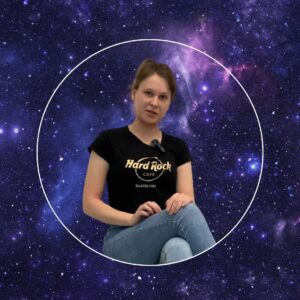 I am Laura Ząbek. I am a doctoral student at AGH University of Krakow in the
I am Laura Ząbek. I am a doctoral student at AGH University of Krakow in the
field of material engineering. I mainly deal with advanced metallic materials and their production in 3D printing processes. I also do a second degree in engineering related to quality engineering.
How did you first hear about UNIVERSEH?
I first heard about UNIVERSEH from one of my best friends, whois also in the
Student Council.
What motivated you to participate in UNIVERSEH activities?
The first thing that motivated me was conversations with students from UNIVERSEH, whom I met when I became interested in what UNIVERSEH was all about. But above all, it was a desire to develop myself, promote knowledge about space, and also the opportunity to learn about other people’s perspectives on these topics. UNIVERSEH reawakened my childhood fascination with space-related topics.
Can you describe a specific task or activity you were involved in?
I think co-hosting SpaceTalk is such an activity for me, despite my initial apprehension, as I had never participated in such activities before and the stress was considerable. SpaceTalk gives me the opportunity to learn many interesting things, develop myself, and, above all, introduce very interesting people and topics to the audience. The second activity that I really enjoyed was the space lessons for children and teens.
What skills or knowledge did you gain from participating in UNIVERSEH activities?
Above all, I am developing my organizational skills and other soft skills. These have allowed me to increase my self-confidence. The second aspect is knowledge directly related to the space sector in general. I have begun to delve deeper into aspects of my specialization that are, or could be, used in the space sector.
Did you collaborate with students from other countries? What was that experience like?
I collaborate with students from other countries on the Students’ Council. It is an incredible experience for me to learn about other perspectives and ideas for future activities.
What does receiving the commitment certificate mean to you personally?
This is a great honor for me and a culmination of my work at UNIVERSEH to date. I am grateful for this recognition and intend to continue my work.
How do you think this recognition will impact your academic or professional future?
I can’t say for sure now, but I think that having such a certificate may have an impact, for example, when recruiting for projects or applying for grants, and they may have an impact on one’s academic and professional future.
In your opinion, why is it important to be recognized for participation in projects like this?
I believe such recognition is important because, firstly, it summarizes your work, confirming that what you’re doing is worthwhile, which boosts your confidence in future actions. It also confirms your commitment to the project, which can impact your future development and market competitiveness.
What advice would you give to other students who are thinking of joining UNIVERSEH?
Just try it. Even if you’re not sure if space is your passion, you’ll definitely grow and discover new perspectives. Sometimes it turns out that seemingly unrelated things or interests have a huge impact on each other.
Omosede, student from LTU (Luleå, Sweden)
Can you briefly introduce yourself and tell us about your academic background?
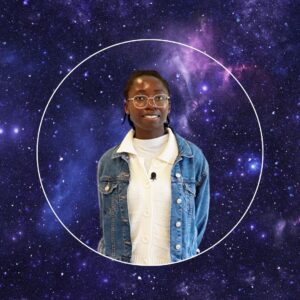 My name is Omosede Esosa Ayes-Ekhator. I study civil engineering, architectural engineering, at Luleå University of Technology.
My name is Omosede Esosa Ayes-Ekhator. I study civil engineering, architectural engineering, at Luleå University of Technology.
How did you first hear about UNIVERSEH?
I first heard about university from my friends. We were searching on the university website, and we saw an ad for the Arctic Winter School. Since I like space, they encouraged me to apply which I did. I was really happy when I got accepted and I went for the weeklong winter activities in Kiruna. It was a lot of fun. And then as from there, here I am.
What motivated you to participate in UNIVERSEH activities?
My interest in space mostly. I’ve always been fascinated by space. I love space movies for example. I’m also deeply interested in planets, the way the universe is built, and all the small pieces of it, nebulas, stars, and everything in between. It’s such a vast and limitless subject, and that’s what makes it so captivating to me.
Can you describe a specific task or activity you were involved in that you really enjoyed?
I really enjoy taking part in the Arctic Winter School. I also like attending the general conferences, they ‘ve been a lot of fun. One of the best parts has been meeting students from all over Europe. They’re funny, full of energy, and such a joy to be around. Since everyone come from different courses and study programmes, each with their own unique interests, the experience is even more exciting and enriching.
What skills or knowledge did you gain from participating in UNIVERSEH activities?
I think I gained a lot of soft skills. Personally, I gained quite a lot of leadership skills for example project management and how to speak in front of a wide audience. I learned how to collaborate with other leaders of ambassador’s clubs, and to manage my own team.
What is it like to collaborate with students from other countries? Why is it fun?
It’s a lot of fun because they all have different impact. They come from different cultures, and they have a different approach to things. For me, collaborating with them is always a learning experience. It often requires me to adjust and tweak my approach, which helps me grow
What does receiving the commitment certificate mean to you personally?
It meant an acknowledgment of my work, that I did a good job.
How do you think this recognition will impact your academic or professional future?
That question is a bit difficult to answer since I haven’t fully seen the results yet. But I do hope this experience will help me advance in my career, both academically and professionally. It has also strengthened my soft skills, which I believe I’ll be able to apply in my future work.
What advice would you give to other students who are thinking of joining UNIVERSEH?
If you’re interested in space, you should get involved. No matter what ideas or background you have, there’s always a way to connect it to space. That’s one of the reasons why it’s so exciting, it really broadens your horizons. For me, the people I meet are what make the experience truly enjoyable. I love meeting new people, learning about them, and hearing their perspectives. Their different approaches are very valuable to me. That’s why I have so much fun!
Justine, student from UNamur (Namur, Belgium)
Can you briefly introduce yourself and tell us about your academic background?
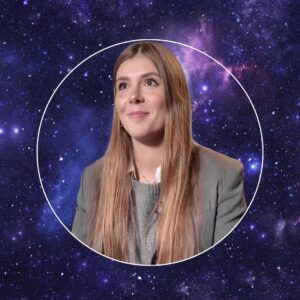 My name is Justine, and I am the PhD student representative of UNamur within the UNIVERSEH alliance. I hold a master’s degree in mathematics, and I am currently doing a PhD in celestial mechanics.
My name is Justine, and I am the PhD student representative of UNamur within the UNIVERSEH alliance. I hold a master’s degree in mathematics, and I am currently doing a PhD in celestial mechanics.
How did you first hear about UNIVERSEH?
I first learned about UNIVERSEH when the UNamur team reached out to me directly. We had an introductory meeting with the president of the student committee, who explained the goals of the alliance and the role of student representatives.
What motivated you to participate in UNIVERSEH activities?
I would say the opportunity to be part of an international alliance dedicated to space-related fields.
Can you describe a specific task or activity you were involved in?
I was initially involved in WP 3, and I’m now part of the Academic Council. I enjoyed attending the General Meeting for the first time the most in Kraków. It was a very nice experience because I discovered the opportunities offered by the alliance, had the chance to meet the other student representatives in person, and had a much clearer understanding of the overall goals and vision of the project.
What skills or knowledge did you gain from participating in UNIVERSEH activities?
I would say intercultural communication and teamwork skills. I could also broaden my perspective on how space-related research and education are developed across Europe.
Did you collaborate with students from other countries? What was that experience like?
Yes, I collaborated with students from different partner universities. I really enjoyed it because I learned a lot from their different academic backgrounds and cultural perspectives. We also had informal moments shared together that I really enjoyed.
What does receiving the commitment certificate mean to you personally?
It symbolizes the implication dedicated to the project and the recognition from the UNIVERSEH alliance.
In your opinion, why is it important to be recognized for participation in projects like this?
It shows how student representatives are important/valuable for the development of the alliance. It can also encourage active participation.
Eléa, student from Comue (Toulouse, France)
Can you briefly introduce yourself and tell us about your academic background?
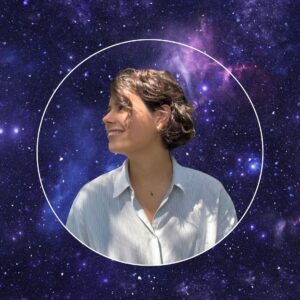 I’m Éléa Bratzler. I hold a Bachelor’s degree in Anthropology and I’m currently pursuing a Master’s in History at the University of Toulouse Jean Jaurès. My Master thesis focuses on how the otherness was constructed in early 20th-century ethnographic projects, and how these representations were shaped by the observer’s own cultural framework. Through this research, I have become increasingly interested in how mechanisms of perception and representation
I’m Éléa Bratzler. I hold a Bachelor’s degree in Anthropology and I’m currently pursuing a Master’s in History at the University of Toulouse Jean Jaurès. My Master thesis focuses on how the otherness was constructed in early 20th-century ethnographic projects, and how these representations were shaped by the observer’s own cultural framework. Through this research, I have become increasingly interested in how mechanisms of perception and representation
influence our understanding of cultural encounters, both in historical settings and in future- oriented fields such as space exploration, where similar dynamics may unfold in new forms.
How did you first hear about UNIVERSEH?
I discovered UNIVERSEH through my university’s ENT platform. The name immediately piqued my curiosity, and I wanted to find out more about this European initiative. After contacting the local student team in Toulouse, I was quickly drawn in and wanted to get more involved.
What motivated you to participate in UNIVERSEH activities?
Coming from a humanities background, I used to think space was a bit out of my reach, something reserved for engineers and astrophysicists. But the more I explored, the more I realized how much human and cultural perspectives matter when we talk about the future of space. UNIVERSEH offers the kind of interdisciplinary space where I can contribute while learning from others. That’s where ideas come alive !
Can you describe a specific task or activity you were involved in?
One activity I particularly enjoyed was organising the Humanité Cosmique conference, with the help of the local student team. I worked on developing the programme, coordinating the speakers and managing the event as a whole. The event brought together students, researchers and the general public to discuss issues relating to our future beyond Earth, from science fiction to space ethics. What struck me most was seeing how sometimes highly theoretical ideas were brought to life in the discussions, raising concrete questions and creating real
connections between the participants. It was demanding, challenging, with a few unforeseen events to deal with, but always a great experience!
What skills or knowledge did you gain from participating in UNIVERSEH activities?
For example, as a WP4 local student representative, I developed valuable communication skills and learned how to collaborate effectively as part of a team. Participating in broader discussions in an environment that values dialogue and openness also provided me with enriching experience. But above all, it has given me greater confidence in sharing my ideas and shown me how essential it is to build strong relationships in order to succeed in a collective project.
Did you collaborate with students from other countries? What was that experience like?
I did, especially through the weekly UNIVERSEH Online Language Cafés. We met to practice alliance languages through games, conversations, and lots of laughs. I really enjoyed that mix, it made learning feel natural and created real connections across Europe in a fun, low-pressure way beyond academics.
What does receiving the commitment certificate mean to you personally?
It’s a gesture that I’m really grateful for. It shows that the time, energy and attention I have devoted to these activities are recognised and appreciated. It’s also a reminder that every idea, every moment of curiosity and exchange has value. It encourages me to continue along this path.
How do you think this recognition will impact your academic or professional future?
It’s more than just a line on a CV, it shows that I’m someone who gets involved, takes initiative, and enjoys working across disciplines and cultures. I believe this mindset can be valuable in many paths.
In your opinion, why is it important to be recognized for participation in projects like this?
Student involvement often takes place behind the scenes, between courses or late at night, and I think it really deserves to be seen. Recognising these efforts is not just about rewarding them, it’s also a way of saying: keep going, you’re making an impact and you can inspire others to do the same. It helps to create an environment where everyone can feel empowered to get involved, in their own way. It’s this collective energy that, in my opinion, really drives these kinds of ambitious projects forward.
What advice would you give to other students who are thinking of joining UNIVERSEH?
Don’t hesitate ! Even if you’re not sure of yourself at first, or if you think your background doesn’t quite fit, UNIVERSEH is exactly the kind of place where diverse perspectives make the experience richer. Say yes to every opportunity, even the small ones. You’ll learn a lot, meet great people, and might just find new ways to connect your passions to space.
Dario, student from UTOV (Rome, Italy)
Can you briefly introduce yourself and tell us about your academic background?
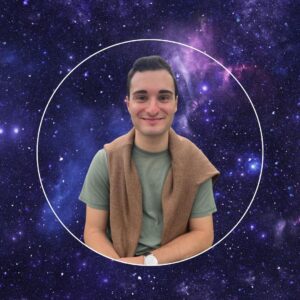 My name is Dario, and I’m currently a senior student in Medicine and Surgery at Tor Vergata University of Rome. I was born and raised in Rome, where I continue to live and study.
My name is Dario, and I’m currently a senior student in Medicine and Surgery at Tor Vergata University of Rome. I was born and raised in Rome, where I continue to live and study.
How did you first hear about UNIVERSEH?
I first learned about UNIVERSEH through my university, when there was a call for student representative nominations. As I explored the project, I was immediately appreciated its focus on inclusivity and its strong international foundation.
What motivated you to participate in UNIVERSEH activities?
I’ve always been passionate about space. In high school, I joined a project where we used satellite data to study climate change in the Arctic Circle. That experience showed me how space research can have a real impact on communities and our planet. UNIVERSEH felt like an opportunity to reconnect with that passion—something I had been missing from my medical studies—while also engaging in meaningful collaboration at both local and international levels.
Can you describe a specific task or activity you were involved in?
From the beginning, I was actively involved in the Student Council, working alongside other student representatives. One of the first things that stood out to me was how each partner university fostered its own local community through different approaches. I really enjoyed seeing how varied strategies led to stronger student engagement, tailored to the needs of each university.
What skills or knowledge did you gain from participating in UNIVERSEH activities?
I learned how cultural and organizational differences can influence the way we approach common goals. It became clear that there’s rarely a single path to success—what matters is finding the strategy that works best in each context. This was a valuable lesson in flexibility, collaboration, and cross-cultural communication.
Did you collaborate with students from other countries? What was that experience like?
Yes, as student representatives we collaborated remotely on several initiatives with peers from across Europe. The highlight was the General Meeting in Luleå last June, where I had the chance to meet fellow students, professors, deans, researchers, and project staff in person. Building those human connections, alongside our joint work, added incredible value to the experience.
What does receiving the commitment certificate mean to you personally?
Receiving the commitment certificate is truly an honour. It’s a recognition of the time, effort, and passion we’ve dedicated to this project. At Tor Vergata, our Local Student Team continues to work closely with university staff to engage more students and raise awareness. We believe that UNIVERSEH offers opportunities for students from all backgrounds, and we’re committed to making those opportunities visible and accessible.
How do you think this recognition will impact your academic or professional future?
This recognition highlights the importance of student contributions beyond academics. As students, we’re already busy studying, doing exams, and internships, so the extra effort we put into a project like UNIVERSEH deserves to be acknowledged. Personally, I believe this experience has helped me grow as a leader and team member, and it has provided skills that will be valuable in both my academic and professional journey.
What advice would you give to other students who are thinking of joining UNIVERSEH?
My advice would be: be open and enjoy the experience of exchange. You might encounter challenges while planning or participating in activities, but every challenge is a chance to learn. UNIVERSEH helps you develop practical skills, like teamwork, communication, and intercultural understanding. These will be useful no matter what career you pursue.